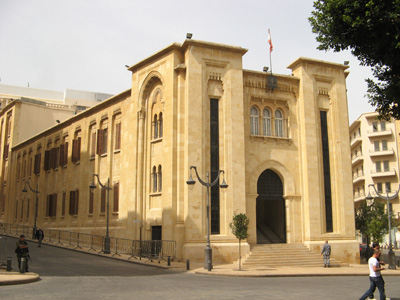Beirut – The MPs of the following political parties will not take part in Tuesday’s controversial legislative session, TV networks reported on Monday

.The Lebanese Forces
The Progressive Socialist Party
The Phalange Party
The parliament’s independent MPs
The Phalange Party chief MP Sami Gemayel announced the boycott of the session in a live video on his Facebook page, noting that the session “will not be public” and “reporters will not be able to attend it.”
“We have been informed that the session’s agenda does not include any law demanded by the Lebanese, such as the law on the judiciary’s independence, the law on recovering stolen funds and the law on lifting bank secrecy,” Gemayel added.
“The priority today is for designating a new premier,” Gemayel stressed, calling on President Michel Aoun to “stop the delay in calling for (binding parliamentary) consultations.”
“In response to the demands of the youths present on the ground, we declare our boycott of tomorrow’s parliamentary session,” he said.
Independent MP Osama Saad, whose supporters are actively taking part in the protest movement that has been sweeping Lebanon since October 17, also announced his boycott of the session.
“Neither the uprising’s demands nor people’s priorities are on the agenda and there will be no discussions on the means to overcome the dangerous, fateful crisis that the country is going through,” Saad said.
MP Hadi Abu al-Hisn of the Progressive Socialist Party meanwhile confirmed that the MPs of the Democratic Gathering will not attend the session, saying “the priority remains for the parliamentary consultations” to name a new PM.
“The first step towards reform should be the adoption of a law on the judiciary’s independence,” he said.
Lebanese Forces leader Samir Geagea stressed as he announced that his MPs will boycott the session “what’s necessary today is to form a salvation government and hold parliamentary consultations” to name a new PM
“The general amnesty law does not fall under the emergency legislation category,” he noted, explaining that parliament can only engage in legislation related to urgent matters in the presence of a caretaker government.
A controversial general amnesty law is on the agenda of the legislative session.
Law to allow politicians to deceive people
Nizar Saghieh, lawyer and founder of the Legal Agenda, explained in a conference last Monday the implications of this law.
He said that a general pardon would “threaten the legal organisation and can cause legal crisis similar to the economical ones we are currently going through.” The lawyer also noted that a specialized court for fiscal crimes will “lead to quotas” since “seven of this court’s members are appointed by the parliament.”
“The country is in a major economic crisis, people are worried about their rights and their money,” said Saghieh.
The lawyer justified the stance on this law by revealing the pardoned crimes it includes: Environmental crimes such as “polluting rivers, like the Litany, and blowing up mountains illegally using draglines;” crimes committed by the “accounting office that supervises the application of the annual budget;” military crimes; crimes committed against internal security forces; and “crimes in which people are threatened by those in power to gain shares in business projects while not contributing to its capital.”
Karim Daher, president of The Lebanese Association for Tax Payers’ Rights also spoke at the conference.
Daher explained the General Amnesty Law from a financial angle by discussing tax evasion and illegal enrichment.
“its almost impossible to hold politicians accountable because at least 20 percent of parliamentary members need to agree to transfer the file to process prosecution,” he said.
Daher added that getting back stolen money is also legally complicated because we have “laws that don’t allow for this unless it is done through the council of ministers.”
Saghieh told Annahar that such a law cannot be passed “unjustified.” He highlighted that this “all inclusive law is only another chance for politicians to deceive people and be excused of their crimes, just like in 1991.”
Saghieh concluded that this law “prohibits the public from justice and fails to target any of the country’s prominent issues.”
Historically speaking, “a general amnesty was passed in 1991 to put an end to the civil war on a legal ground after the Taif Agreement had ended it politically,” Chloe Kattar, a PhD holder in Lebanese history, told Annahar.
“This way, all political leaders got impunity and there was no public resistance to it since population was exhausted after 15 years of war,” explained Kattar “it was a collective moral agreement by the public to let this pardon pass so that a new page can be turned.”
Regarding today’s context in comparison to 1991, Kattar noted “today, we are not traumatized by any long lasting wars, so there’s no moral or ethical incentive for the public to allow the passing of a general pardon.”
Speaker Nabih Berri had postponed the session last Tuesday over “security concerns.”
Protesters have vowed to prevent the session from being held are holding Berri responsible for any bloodshed Tuesday should he insist on holding the legislative session.

Leave a Reply
You must be logged in to post a comment.